Share
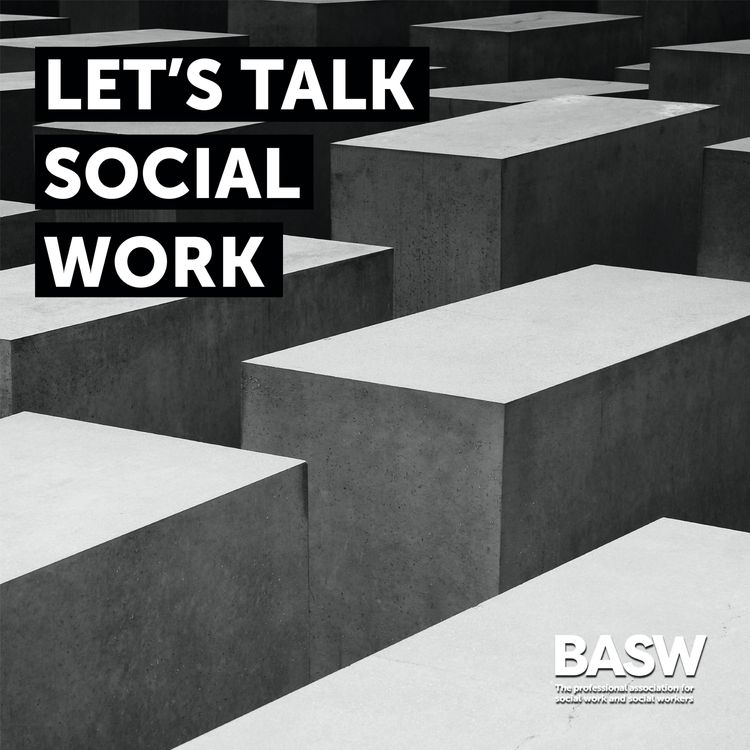
Let's Talk Social Work
Challenging Antisemitism in all its forms
In this episode, Andy McClenaghan is joined by guests Sam Lethbridge, Incidents Manager at the Community Security Trust and Paul Shuttleworth, Professional Officer with BASW England to discuss antisemitism—what it means, what its impacts are and how social workers can stand against and address antisemitism across our society.
Both Paul and Sam draw on their personal experiences as British Jewish people as they share their views on how antisemitism affects them and their communities.
Community Security Trust (CST) is a charity that protects British Jews from antisemitism and related threats. If you are the victim of an antisemitic incident or you have information regarding an antisemitic incident that happened to somebody else, please contact CST https://cst.org.uk/report-incident.
David Baddiel’s book, ‘Jews Don’t Count’, is mentioned several times during the conversation as something Paul and Sam found reflected their own experiences of antisemitism. To find out more about the book visit https://www.goodreads.com/en/book/show/52710961-jews-don-t-count
During the conversation, reference is made to the Israeli-Palestinian conflict. Organisations, including Amnesty International have claimed Israeli authorities are committing the crime of apartheid against Palestinians. To read Amnesty International’s report outlining this perspective, visit https://www.amnesty.org/en/latest/news/2022/02/israels-apartheid-against-palestinians-a-cruel-system-of-domination-and-a-crime-against-humanity/
To read BASW UK's statement against antisemitism and anti-Jewish discrimination and hatred, visit https://www.basw.co.uk/basw-uk-statement-against-antisemitism-and-anti-jewish-discrimination-and-hatred
More episodes
View all episodes
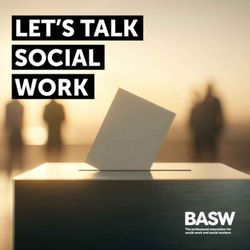
Scotland and Wales Decide
55:28|Significant elections are taking place in Scotland and Wales this year.With the current political mood so unpredictable, the make-up of Holyrood in Edinburgh and the Senedd in Cardiff could be very different after May. And given that social work in Scotland and Wales is the full responsibility of these legislatures, any change is likely to have a sizeable impact on decisions taken about the profession, the workforce, and the people that social workers support.So, what does social work need to be telling the parties and individuals vying for power? The Scottish Association of Social Work (SASW) and BASW Cymru have both set out their manifestos which they want to see the next devolved governments take forward. This episode will consider what these asks are and which political levers they intend to pull to get them accepted.Host Jonny Adamson is joined by three guests who have all played a major role in developing these manifestos and the campaigning strategies around them. Caroline McDonald, Social Work Team Leader in Children’s Services at Glasgow City Council and Co-Chair of SASW, Andrew Pennington, Senior Social Work Practitioner at Powys County Council and Chair of BASW Cymru, and George Hannah, Senior Public Affairs Officer for SASW.They discuss how politics differs in Scotland and Wales to other parts of the UK, social work’s role in promoting the vote, and how the profession can use its voice more loudly to affect change in communities across the UK. They also hazard a guess as to who the political winners and losers could be come polling day.Our thanks to James Ede at Be Heard Productions for producing the episode.BASW Cymru manifesto for 2026: Cymru Decides: https://basw.co.uk/policy-and-practice/resources/basw-cymru-manifesto-2026-cymru-decides A secure future for Scottish social work: https://basw.co.uk/policy-and-practice/resources/secure-future-scottish-social-work Scottish Parliament Election Hub 2026: https://basw.co.uk/about-basw/social-work-around-uk/sasw-basw-scotland/scottish-parliament-election-hub-2026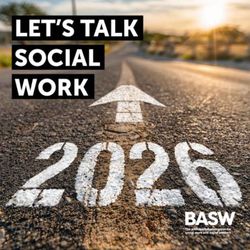
What does the future hold for social work and BASW?
01:08:54|Let’s Talk Social Work is kickstarting 2026 with a broad episode exploring the state of the profession in the UK.Host Jonny Adamson is joined by BASW Interim Chief Executive, Professor Sam Baron, BASW England Acting Chair, Shantel Thomas, and Professional Officer at the Scottish Association of Social Work, Susan Dobson for a frank discussion on the challenges currently facing social work, their vision for the profession, and BASW’s role within it all given that the professional association is currently holding its own ‘Big Conversation’.They cover a number of topical issues affecting social workers and wider society – including working conditions, social work’s identity, political activism, adult social care, and the growing hostility caused by the far right. As well as focusing on the here and now, the guests also make their predictions for the year ahead as they reflect on the question - should we be feeling worried or hopeful?Overall, this unique episode tees us up perfectly for many of the topics we’re likely to consider in greater depth on the podcast in 2026, while also hopefully sparking important conversations and debate across the social work profession today.Thanks to James Ede at BeHeard Production for producing the episode: https://www.beheard.org.uk/
The Impact of Domestic Abuse on Babies and Infants
01:00:06|One third of domestic abuse begins during pregnancy, rising to 40% within a baby’s first 1001 days of life. It contributes to around one in four babies entering care, making it the highest-ranking factor for children’s safeguarding.Despite landmark legislation being introduced across the UK to protect children against domestic abuse, a recent report by the Children’s Commissioner for England and Wales - “Victims in their own right: Babies, children and young people’s experiences of domestic abuse” – has been highly critical of whether it is resulting in changes to practice.This episode of Let’s Talk Social Work, produced to mark the 16 Days of Activism Against Gender Based-Violence campaign, explores why the system is still failing too many babies and infants across the UK. We’re joined by Lauren Seager-Smith, CEO of The For Baby’s Sake Trust, Becky Reynolds, a qualified social worker and Deputy Director of Operations at The For Baby’s Sake Trust, and Paddi Vint, a Quality and Development Manager at the NSPCC.We discuss the causes and implications of domestic abuse on babies and infants, how social workers can safeguard victims, raise the alarm and prevent instances of domestic abuse from occurring, and whether the profession is as well-equipped as it should be to respond.This episode covers a lot of very upsetting and distressing themes, so listener discretion is advised. If you want to access support, the following helplines are available:· National Domestic Abuse Helpline – 0808 2000 247 (run by Refuge): https://www.nationaldahelpline.org.uk/· Rights of Women advice lines, there are a range of services available: https://www.rightsofwomen.org.uk/· The Men’s Advice Line, for male domestic abuse survivors – 0808 801 0327 (run by Respect): https://mensadviceline.org.uk/· The Mix, free information and support for under 25s in the UK – 0808 808 4994: https://www.themix.org.uk/get-support· National LGBT+ Domestic Abuse Helpline – 0800 999 5428 (run by Galop) : https://www.galop.org.uk/Samaritans (24/7 service) – 116 123: https://www.samaritans.org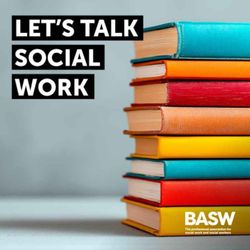
Can we go higher? Opportunities for further education in social work
57:15|Higher degrees, such as a Master’s or a Doctoral, can prove extremely valuable for social workers and their practice. But is it a realistic and accessible option for social workers to undertake further education while still working?When you factor in a lack of time, unmanageable workloads, difficulties obtaining funding, not to mention the practicalities of studying while at the same time navigating a complex career, you’d be forgiven for thinking that there’s too many barriers to choosing this path. So, what can be done about it?In this episode, Jonny Adamson is joined by three social workers who all have experience of being in higher education while continuing to practice full-time. Dr Lucy Treby, Karen Hillison and Dr Mike Starr each share insights into their own journeys, as well as advice and ‘top tips’ for social workers considering taking a similar route. They also discuss what needs to change, both in social work and higher education systems, to break down the barriers that currently exist for professionals and they examine the benefits to the profession of enabling more social workers to scale up their qualifications.Lucy and Karen are also Trustees for the Social Workers Educational Trust (SWET) which is mentioned throughout the episode. The charity supports social workers to develop their knowledge and skills through higher education. More information about SWET can be found here.Our thanks to James Ede at BeHeard for producing the episode.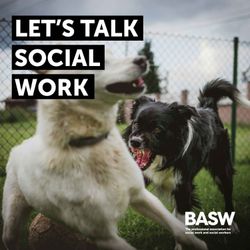
Beware of the Dog - how should social workers manage encounters with dogs?
52:12|Social workers frequently come into contact with dogs in their practice. Yet until now, it hasn't featured in social work research, education, training and guidance.A recent study published in the British Journal of Social Work entitled ‘We’re not professionals when it comes to dogs:’ Social work encounters with dogs and their implications for education and practice sets out to address this omission. The research examines the risks and complexities that social workers might be faced with when encountering dogs, making a compelling case for greater attention on this subject area.In this episode, Jonny Adamson is joined by the author of the research, Professor Denise Turner, social worker Sarah Long, who participated in the study and experienced aggressive dog behaviour while on a visit, and Certified Animal Behaviourist, Andrew Hale who specialises in complex animal behaviour cases.They discuss how professionals can assess and minimise risk to themselves and others when encountering dogs, improvements and adjustments that employers could make to working practices, training and support needs for the profession, and the cultural, religious and health considerations which are being overlooked.Our thanks to James Ede at BeHeard for producing the episode.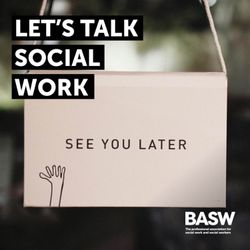
The Handover
49:34|After 93 episodes, Andy McClenaghan is moving on from hosting Let’s Talk Social Work. Following a short break, the podcast will return in the autumn and will be hosted by BASW’s Jonny Adamson. In this episode, Andy is joined by Jonny to discuss the past four and a half years making Let’s Talk Social Work. They explore standout episodes, key learning points, topics that Andy didn’t get to cover, and what big issues might feature on the podcast over the coming years.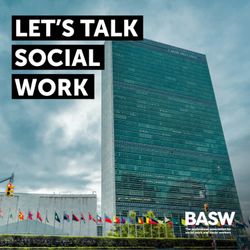
Solidarity Forever: exploring the role of social work in promoting international solidarity and human rights
52:19|This special episode has been made to celebrate World Social Work Day 2025, the theme of which is ‘Strengthening Intergenerational Solidarity for Enduring Wellbeing’. Andy McClenaghan is joined by Professor Cecilia Bailliet, United Nations Independent Expert on human rights and international solidarity, and friend of the podcast Janet Walker, Professor Emeritus of International Social Work at the University of Lincoln and Chair of the British Association of Social Workers International Committee. During their conversation they explore what international solidarity means and it’s place in the context of human rights. The discussion examines threats to international solidarity and opportunities for its promotion, and looks at the role of social work in advancing international solidarity as key component of efforts to uphold human rights and work towards social justice.In the episode Celia refers to the International Solidarity Map for Peace and Human Rights. This article from the UN Chronicle explains more about why the map was created.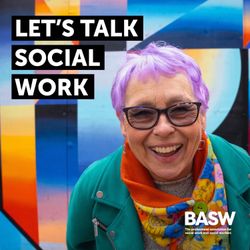
Discussing the state of dementia training for social workers and social care workers
51:45|In episode 91 Andy McClenaghan is joined by Abigail Gagen, Emily Hindle and Angie Button to discuss how dementia affects people’s lives and explore how social workers and social care workers can meet the needs of people with dementia and their families.Emily is Policy Manager with the Alzheimer’s Society and Abi is a social worker who works as a Team Manager at North Yorkshire Council and is also a member of BASW England’s Adults Social Work Thematic Group. Angie is Operational Social Work Lead at Humber Teaching NHS Foundation Trust and Chair of the BASW England Social Workers in Health Group. During the conversation reference is made to the Alzheimer’s Society report Because we’re human too and the blog Someone to Safeguard by social worker, Rob Mitchell.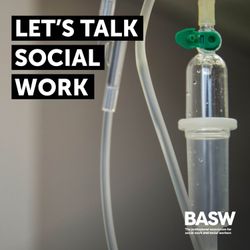
Exploring what the Terminally Ill Adults (End of Life) Bill could mean for social work
56:56|In the first episode of Let’s Talk Social Work of 2025 Andy McClenaghan is joined by Chair of the British Association of Social Workers, Julia Ross, Chair of BASW’s Policy Ethics and Human Rights Committee, Annie Ho and Co-Chair of the Association of Palliative Care Social Workers, Glynis Berry to discuss the potential change in the law for England and Wales which would legally permit people to seek assistance to end their own lives.On 16 October 2024, the Labour MP Kim Leadbeater presented the Terminally Ill Adults (End of Life) Bill to Parliament. On 29 November MPs debated the legislation and the outcome was 330 MPs voted in favour of the Bill and 275 MPs opposed it, allowing the legislation to proceed to the next parliamentary stage.The conversation doesn’t explore arguments for and against allowing terminally ill people to end their own lives. What it does is examine the implications for social work practice that would arise if the legislation, in its current form were to become law. The discussion also examines the state of palliative care services in the UK as this is an issue closely linked to the debate around assisted dying.